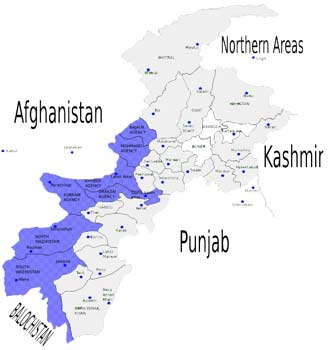US steps up pressure across Pakistan's FATA region, including ground assaults
11 Sep 2008
Washington: With American UAV-borne missile attacks in Pakistan's Federally Administered Tribal Agency (FATA) increasing in frequency and also, for the first time, being coupled with ground-launched commando attacks, the time may have come for the United States and Pakistan to be blunt about their intentions with respect to the war against the Al Qaeda.
 In a quick turn of events Tuesday, US president George Bush warned through a speech that ''extremists are increasingly using Pakistan as a base from which to destabilize Afghanistan's young democracy.''
In a quick turn of events Tuesday, US president George Bush warned through a speech that ''extremists are increasingly using Pakistan as a base from which to destabilize Afghanistan's young democracy.''
''Defeating these terrorist and extremists is in Pakistan's interest... also Pakistan's responsibility -- because every nation has an obligation to govern its own territory and make certain that it does not become a safe haven for terror,'' Bush said.
He was speaking at the National Defense University.
A few hours later a report in The New York Times suggested that the president had secretly approved orders which for the first time allowed US special operations forces to carry out ground assaults inside Pakistan without clearance from Islamabad. According to the report, this sanction was granted by the president as early as July.
The report was buttressed by comments from senior US officials who said that Pakistan has not only failed to act against terrorism, but promoted it, including last month's attack on the Indian embassy in Kabul.
By way of a strong and immediate response, the Pakistan army chief Gen Ashfaq Pervez Kayani threatened to repulse any attack on its territory. In what observers dubbed as an unusually strong public statement Wednesday, Gen Kayani said that a US raid last week into Pakistan's South Waziristan region killed innocent civilians.
According to Gen Kayani, such operations were not covered by any agreements between Pakistan and US-led forces in Afghanistan, and also that such a ''unilateral approach'' risked arousing hostility in the region.
"Falling for short term gains while ignoring our long term interest is not the right way forward," Gen Kayani was quoted in a Pakistan armed forces media release. "To succeed, the coalition would be required to display strategic patience and help the other side the way they want it, rather than adopting a unilateral approach."
The global campaign against terror has now begun to focus itself heavily on Pakistan's FATA region.
The New York Times report would appear to have been confirmed publicly by the chairman of the US joint chiefs of staff, Admiral Mike Mullen, who told a Congressional hearing that he was ''looking at a new, more comprehensive strategy for the region'' that would cover ''both sides'' of the Afghanistan-Pakistan border.
Earlier, the Pakistan government called in the US ambassador in Islamabad to lodge a strong protest over a commando raid across the border, where helicopter-borne US Navy Seals, part of the special operations forces, swept into South Waziristan and killed about 15 people, according to local sources .
The dead included civilians Pakistani officials said, quoting local sources.
At their end, US officials confirmed that it was an American operation but provided no details. Their was also no inkling of the objective behind the raid.
A US missile strike Monday in the North Waziristan tribal region destroyed a seminary and houses associated with Jalaluddin Haqqani, a veteran Taliban commander, and killed 20 civilians, including women and children as well as four foreign militants, officials said.
Pakistani intelligence officials identified the foreign militants as Abu Qasim, Abu Musa, Abu Hamza and Abu Haris. This last named led al-Qaida efforts in the tribal areas, while Abu Hamza led activities in Peshawar, the main northwest city.
The ''unilateral'' American approach and the strong response from Gen Kayani marks a heightening of tensions that may not bode well for the region. Observers point out that the Pakistani response may have been intended more for public consumption as the ground reality within the country may not be conducive for the Pakistani establishment to take on the might of the United States.
Even as the country's economy heads for a gradual collapse, the country's north, west and south-west regions, which are traditionally autonomous, are now looking to slip completely out of control with foreign coalition forces and bands of Taliban, al Qaeda and regional nationalist elements criss-crossing borders launching attacks and seeking safe havens.
The tribal belt of the FATA area has long been considered a possible hiding place for Osama bin Laden and his second-in-command Ayman al-Zawahri. Persistent failure on the Pakistan Army's part to launch operations to flush out the al Qaeda and the Taliban elements from the region has led to heightened frustration in the White House as the Bush presidency slowly winds it way to a close.


















